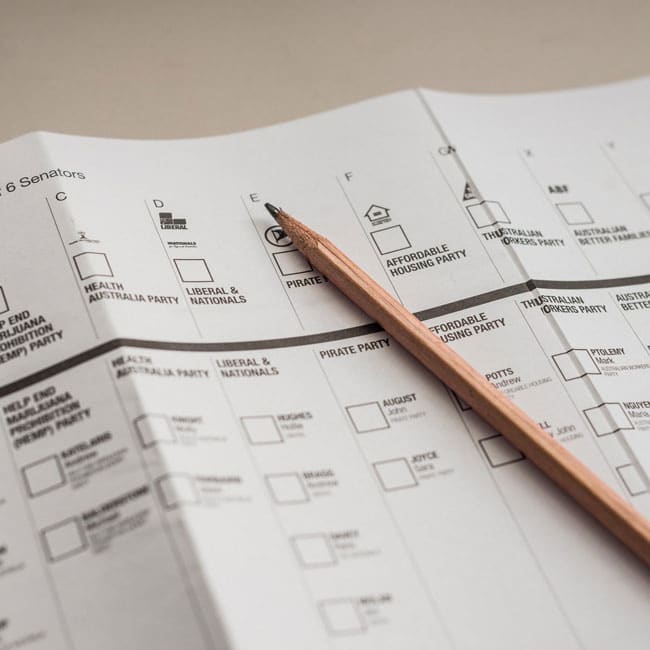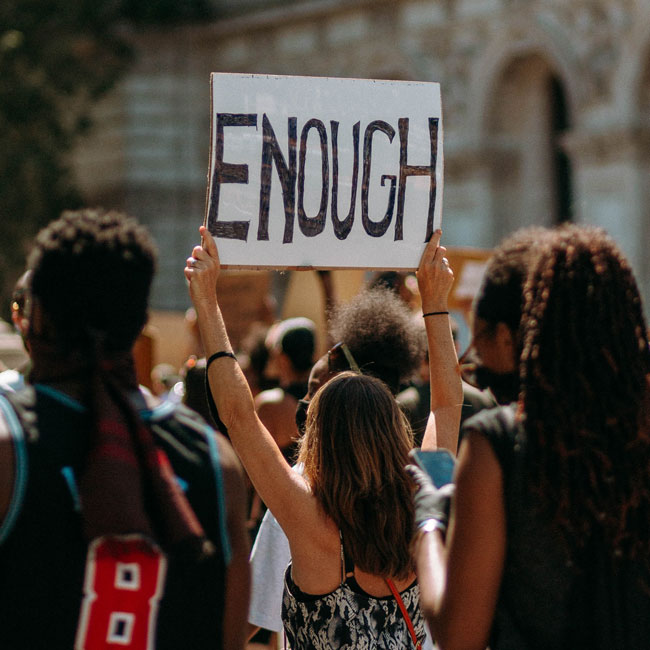
Israel or Palestine: Do you have to pick a side?
Opinion + AnalysisPolitics + Human Rights
BY The Ethics Centre 27 OCT 2023
We are inclined to pick a side in complex conflicts, but doing so can diminish our ethical point of view.
In the early hours of 7 October 2023, Hamas launched a barrage of rockets from Gaza into Israel while armed terrorists crossed the border and began a rampage of death and destruction targeting civilians, including children. In the days that followed, Israeli forces retaliated by blockading Gaza, cutting off food, electricity and water supplies, and began bombarding the densely populated city, killing thousands of Palestinian civilians, including children.
When our news screens are filled with footage of such horrors, our moral minds cry out for justice. But justice for whom?
One of the quirks of our moral minds is that we tend to see the world in terms of black and white or good and evil. If we hear about a heinous or unjust act, our sympathies go out to the victims while outrage inspires us to want the perpetrators to be punished. This sorts the world into two categories: the wronged, who deserve sympathy and protection, and the wrongdoers, who are morally diminished or even dehumanised.
Another quirk of our moral minds is that we struggle with ambivalence, which is the ability to see something as being both good and bad at the same time. Once someone – or a group – are painted as the wronged, it’s difficult to also perceive them simultaneously as being wrongdoers in some other capacity. Attempting to do so creates an uncomfortable state of dissonance, and the easiest way to resolve it is to dismiss the troubling thought and collapse things back into black and white.
On top of this we have our personal connections and affiliations, or a sense of shared identity that can cause us to feel solidarity with one side rather than the other. This in-group solidarity is then reinforced through shared expressions of grief and outrage. It is also policed, with any signs of sympathy for the “other side” drawing stiff rebuke.
This is all natural. It’s how our moral minds are wired. So, it’s no surprise that in the case of the Israel-Palestine conflict, many people have already picked a side. But just because it’s a natural inclination doesn’t mean it’s always a healthy one.
Picking a side can shrink our view, making us see the world through that side’s ethical lens and dismissing other possibly valid perspectives.
This is particularly apparent when we’re faced with gaps in the information we receive – as we often are during times of conflict. We tend to fill ambiguity with our own biases, and we seek out information to reinforce our view while discounting evidence to the contrary.
Picking sides can also prevent us from seeing the bigger ethical picture. And in the case of the conflict between Israel and Palestine, the bigger picture is a long history laced with ethical complexities.
However, there is another way. It requires us to acknowledge, but not necessarily follow, our moral intuitions, and instead step back to take a more universal ethical point of view. This is not the same as a neutrality that is indifferent to the claims of either side or to questions of right and wrong. It is taking the side of principle, which is a basis by which we can judge all parties.
Justice for all
Most ethical frameworks offered by philosophers are universalist, in the sense that they apply equally to all morally worthwhile individuals in similar situations. So, if you believe that it’s wrong to kill a particular individual because they’re an innocent civilian, then you should also believe that it’s wrong to kill any individual who is an innocent civilian.
You might justify that in consequentialist terms, such as by arguing that killing innocent civilians causes undue and irrevocable harm, and that the world is a better place when civilians are protected from such harm. You could equally justify it using a rights-based ethics, such as by arguing that all people have a fundamental right to life and safety.
While philosophers have a variety of views on which specific ethical framework or universal principles we ought to adopt, there are some principles that are widely accepted, with many being coded into the Universal Declaration of Human Rights. These include things like a right to life, liberty and security of person, a right to freedom of movement within the borders of one’s state, and that people shall not be arbitrarily deprived of property, as well as a right to the free expression of one’s religion.
The virtue of taking such a principled approach is that is gives us a bedrock upon which we can base our judgements of any action, agent or government. It promotes a sympathetic stance towards all suffering, and aims us towards justice for all, without shying away from condemning that which is harmful or unjust.
It might challenge our partisan feelings that favour the interests of one side over the other, but it urges us to condemn wrongdoing on any side, such attacks targeting civilians or waging war without ethical constraint.
A principled perspective also enables us to navigate complex ethical issues, such as saying that the Israeli occupation of Palestinian land might be unjust, but that it shouldn’t justify Hamas attacking civilians. Or that Hamas’s attacking civilians is clearly morally repugnant, but that shouldn’t justify the collective punishment of Gazans by Israel. And it can allow us to assert that Israel might have a right to defend its territory and citizens from attack, but it – indeed, all parties – must adhere to just war principles, such as proportionality and distinguishing between enemy combatants and civilians. And it ought to reinforce our commitment to seeing a lasting peace in the region, which will inevitably require some compromises on both sides.
Of course, even if everyone agreed on the same set of principles, there will still be substantial differences in interpretation or points of view. A principled stance must also acknowledge that there are fundamental incompatibilities between the interests and demands of both sides that no single ethical framework will be able to resolve without some kind of compromise. For example, when both sides claim certain sites as sacred, and demand exclusivity, there is no way to resolve that without compromise that will be deemed unacceptable to at least one side. However, such uncertainties and complexities don’t undermine the fact that the same universal principles ought to apply to all people involved.
Choosing to side with ethical principle rather than one side or the other is not without its challenges. It forces us to push back on some of our deep moral intuitions and sit with ambivalence and ambiguity. We might be admonished by both sides in the conflict for not backing all their claims, or called a traitor for criticising them. However, the strength is that we can respond to each of these challenges by resorting to the universal principles, compassion and desire for justice that underpins our views on both sides of the conflict.
While the internet and media landscape seem to urge us to take sides in any conflict, it is entirely possible – and often wise – to step back and apply a broader set of principles rather than fall in with a particular partisan perspective. Adopting such a principled stance doesn’t require that you have all the solutions to the conflict, it is sufficient that you have good reason to wish for a just and peaceful solution for all involved.
Image: AAP Photo / Erik S. Lesser
BY The Ethics Centre
The Ethics Centre is a not-for-profit organisation developing innovative programs, services and experiences, designed to bring ethics to the centre of professional and personal life.
Ethics in your inbox.
Get the latest inspiration, intelligence, events & more.
By signing up you agree to our privacy policy
You might be interested in…
Opinion + Analysis
Politics + Human Rights
Ask an ethicist: Why should I vote when everyone sucks?
Opinion + Analysis
Politics + Human Rights
How far should you go for what you believe in?
Opinion + Analysis
Business + Leadership, Politics + Human Rights, Relationships
It’s time to increase racial literacy within our organisations
Big thinker
Politics + Human Rights




